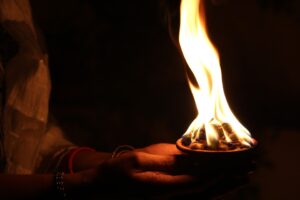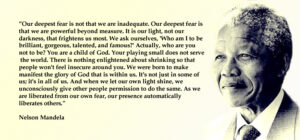What is svādhyāyam (introspection), the third niyama (self-control)?
 Sva means “self’ or “belonging to me”, adhyāyam means “inquiry” or “examination”. Also, svādhyāyam literally means, “to get close to something.” Additionally, in this context, it means to study oneself through meditation or contemplation (mimāmsa).
Sva means “self’ or “belonging to me”, adhyāyam means “inquiry” or “examination”. Also, svādhyāyam literally means, “to get close to something.” Additionally, in this context, it means to study oneself through meditation or contemplation (mimāmsa).
Importantly, contemplation or reflection increases awareness (prajñā) at two levels – a gross component (sthūla) and a subtle component (sūkṣma). So, when we review any situation, our understanding and cognition of both components evolve. This is called reflection (mimāmsa) which is an element of introspection (svādhyāyam).
Gross (sthūla) – The gross aspect is everything that can be cognised by the senses (indriya), cognitive apparatus (manas) and logic (buddhi).
For example: the world we see around us is made of the primordial elements (panchabhūtas) such as earth (prithvi), water (áp), fire (agni), air (vāyu), space (ākāṣa).
- Firstly, all natural elements can be sensed by the sensory system and decoded by the cognitive and logical apparatus.
- For example, when we shop for vegetables, we look at the gross aspects of the vegetable. For instance, we check colour, texture and feel to ascertain its health through our sensory apparatus. Then, this information is decoded by our cognitive and logical apparatus.
- Importantly, this principle covers the physical aspect of any entity like our bodies. Also, it includes physical structures like factories, shops or even systems.
- Lastly, in yoga, the gross (sthūla) aspect includes physical sheath (anna-maya-kośa) and sheath of motility / that which makes it work prāṇa (prāṇa-maya-kośa).
Subtle (sūkṣma) – The awareness of gross element is driven by an underlying subtle principle, which is the consciousness (citta).
For example – The internal combustion engine is driven on the principle of “Ideal gas law” that when the temperature of a gas is increased, pressure increases and this makes the gas expand.
- The gross (sthūla) element is the internal combustion engine, which is physically available to the senses in the form of earth, water, fire, air and space (panchabhūtas).
- The subtle element (sūkṣma) is the cognition of the principle of “Ideal gas law” (mano-maya-koṣa) and adapting it to build a system (vijñāna-maya-koṣa) that uses fuel to drive the engine.
- The awareness of this subtle principle (sūkṣma-śarīra) is driven by the consciousness (citta) which takes the principle (vijñāna-maya-koṣa) and visualises it (mano-maya-koṣa) into a gross body (sthūla-śarīra).
- In the body, this is the awareness of the movement of consciousness within the body is called sheath of cognition (mano-maya-koṣa) and sheath of awareness of the system (vijñāna-maya-koṣa),
For instance, when you read this sentence, the primary information you see is derived through its physical attributes (sthūla-śarīra). Next, you cognise the alphabets and words that are transmitted through a device. However, your experience of the underlying principles (sūkṣma-śarīra) comes from the quality of your awareness as you decipher the information (mano-maya-koṣa) relating to the subject (vijñāna-maya-koṣa).
Anecdotes, experiences and situations to help understand introspection (svādhyāyam).

(Wikipedia extract) Nelson Mandela was born into a Thembu royal family. His early life was dominated by traditional Thembu custom and taboo. Growing up, Mandela attended church services every Sunday with his guardians and Christianity became a significant part of his life. However, he never really gave up his Thembu heritage.
In college, he was a supporter of the British but was rusticated for protesting against the management. Running away from an arranged marriage, he moved to Johannesburg where he pursued a career in law where he found himself attracted to communism. He got involved in South African politics and became part of ANC, becoming a founding member of ANC- Youth League. Also, he participated in the anti-apartheid Defiance Campaign.
Initially a peaceful protester, organizer and leader, he worked to unite all non-whites into a cohesive opposition. Finally, concluding that peaceful solution was not achievable, he began to advocate violent opposition to apartheid. As a result, he was imprisoned for 25 years, where he was subjected to privation and torture. Mandela studied Islam in prison. Lastly, when he was released, now having worldwide acclaim and recognition, he transformed to a moderate politician advocating unity and reconciliation.
- Trace the changes to Nelson Mandela’s thinking and view on life.
- How does Mandela reconcile what he wants with what he can get?
- What was the manner of his reconciliation of so many diverse views?
- How did he manage fear?
- Is reflection of experiences structured? Or is it flashes of inspiration?
For more on introspection, click here
Points to Ponder on contentment (santoṣam).
Internal Tags: Karma, Dharma (conditioning), Stress and Situational Awareness, Stress and prana, Awareness measures, Bhakti Yoga fundamentals, Jnana Yoga, Karma Yoga, Hatha Yoga and Raja Yoga.
External Tags: Consciousness
- What happens when we accept our fate?
- How do we reconcile evidence with intuition?
- Is there any change in our awareness when we reflect on our sense of identity?
- What are the changes that our sense of identity experiences with each reflection? Is this static or does our awareness of identity change with each reflection?
- When does reflection result in a feeling of serenity or balance within us?
- How important is emotional stability in reflection?


